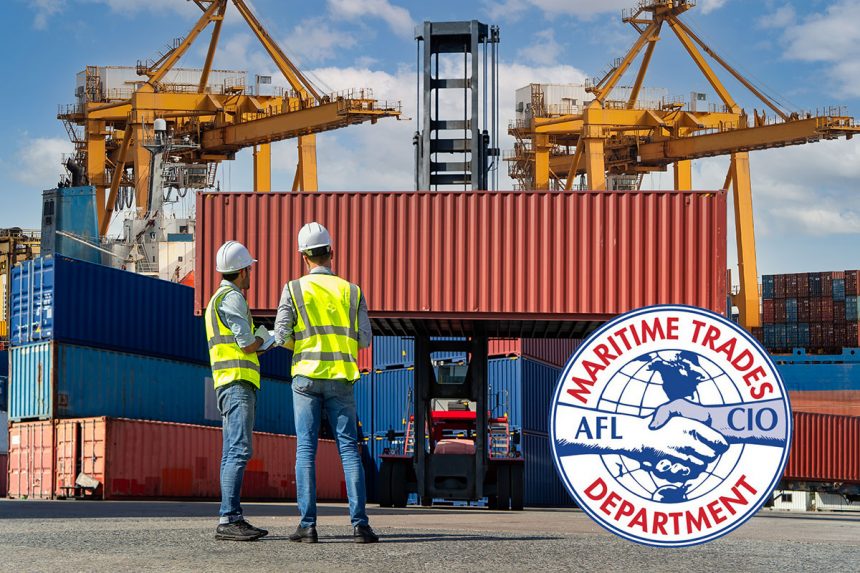The following is a joint letter signed by the presidents of the U.S.-flag maritime unions (including MTD President Michael Sacco) to U.S. Coast Guard Commandant Robert J. Papp Jr. in response to an editorial posted on the USCG Homeport website by Captain Eric Christensen, Chief of Commercial vessel Compliance. The text of the letter from the union presidents appears below. A PDF version may be accessed by clicking HERE.
Text of Letter from Union Presidents to Admiral Papp
As chief representatives of the major sea-going labor unions, we are writing to express our strong objection to the claims raised in an article written by Captain Eric Christensen, Chief of Commercial Vessel Compliance for the Coast Guard, which was posted to the USCG Homeport website and has been carried in the maritime industry trade press. This article has been used by U.S.-flag critics to blast the American merchant marine.
While we agree with Captain Christensen that the United States flag should never appear on the gray list of any flag state control regime, it does not come as a surprise. The maritime unions have been advising the Coast Guard for some time that such an outcome would come to pass if steps were not taken to more efficiently administer regulations and correct failures, particularly with non-union companies with historically bad track records on maintenance, safety and regulatory compliance. To place the blame on the shoulders of all American shipowners and crews, however, fails to recognize the true issue and is extremely disingenuous.
At the same time, while we understand that while the Paris MOU – a flag state control regime to which the United States is not a party – has moved the U.S.-flag off their “white” list, we firmly believe that this fact alone is at best a grossly misleading indicator of U.S.-flag performance. In fact, the Paris MOU acknowledges that of the 174 vessel inspections of U.S.-flag vessels by its member-states, only 7 vessel detentions have been recorded. This is hardly an “alarming trend” representative of a significant decline in statutory and international convention compliance.
Captain Christensen’s article is a mischaracterization of the professionalism and dedication of the United States flag commercial ship operators and their highly trained crews. We must emphasize the total disregard by Captain Christensen for all the advances in training, safety, and education our members achieved that go beyond mere compliance. TransAtlantic Lines’ bad behavior, which has rightfully resulted in the revocation of their ISM Document of Compliance, should not be sufficient to call into question the entire U.S.-flag commercial industry’s commitment to safety, training, and compliance. We would hope that in the future, the USCG would be working with us to address the wide range of problems – including issues with the overall USCG regulatory regime – that confront the US-flag industry, rather than point fingers and “sound the general alarm.”
We believe that part of the problem lies in the United States regulatory regime that the Coast Guard administers in accordance with the Administrative Procedures Act itself. The rulemaking procedures in the Act make it difficult for the USCG to respond to IMO treaty obligations in a timely fashion. As a result, IMO obligations come into force and the US is not in compliance with international standards. Even simply updating American regulations to conform to international standards can take a considerable amount of time. Changes to the APA are unlikely, making Coast Guard interim guidance and advisory notices critical to bridging the gap until final regulations are promulgated.
The USCG Legal Division’s resistance to permitting the USCG to disseminate non-mandatory advisory notices on international requirements until after regulations are in place, compounds this problem rather than alleviating it. The result is that U.S.-flag ships and operators are left to their own devices in determining how to comply with IMO requirements, thus exposing them to penalties from port state control regimes like the Paris MOU. This is presently occurring with the STCW Manila Amendments related to work and rest hours. (STCW Code, Ch. VIII, Section A-VIII/1). Although the new STCW Manila Amendments came into effect January 1, 2012, USCG has not yet promulgated regulations conforming to the international standard nor offered any effective guidance. Without proper regulatory guidance by the USCG, our members and U.S. vessel operators are exposed to port state sanctions and severe criminal penalties, including imprisonment. This is unacceptable.
Again, in the future, we would prefer to work together to resolve these issues, rather than have senior Coast Guard officials indict the entire industry because of the bad behavior of a very small minority of bad actors in public.
We welcome the opportunity to work with you in person to clarify these issues further. As always, we remain committed to ensuring that American mariners are the best trained and most professional mariners in the world.
Sincerely,
Michael Sacco, President, Seafarers International Union
Captain Tim Brown, President, Intl. Organization of Masters, Mates and Pilots
Michael Jewell, President, Marine Engineers’ Beneficial Association
Thomas Bethel, President, American Maritime Officers

